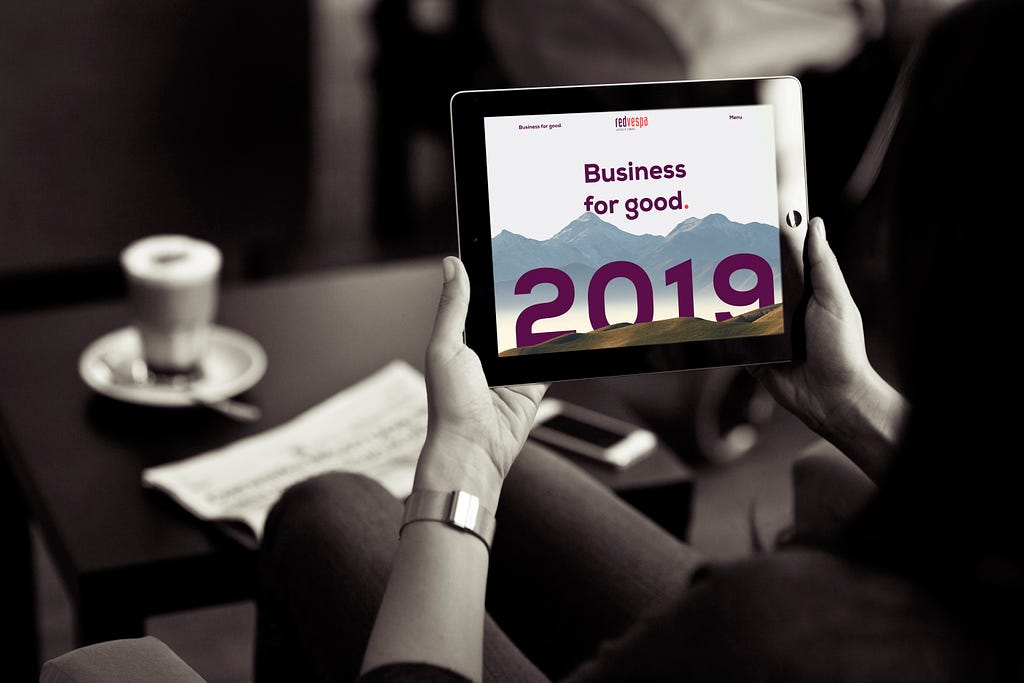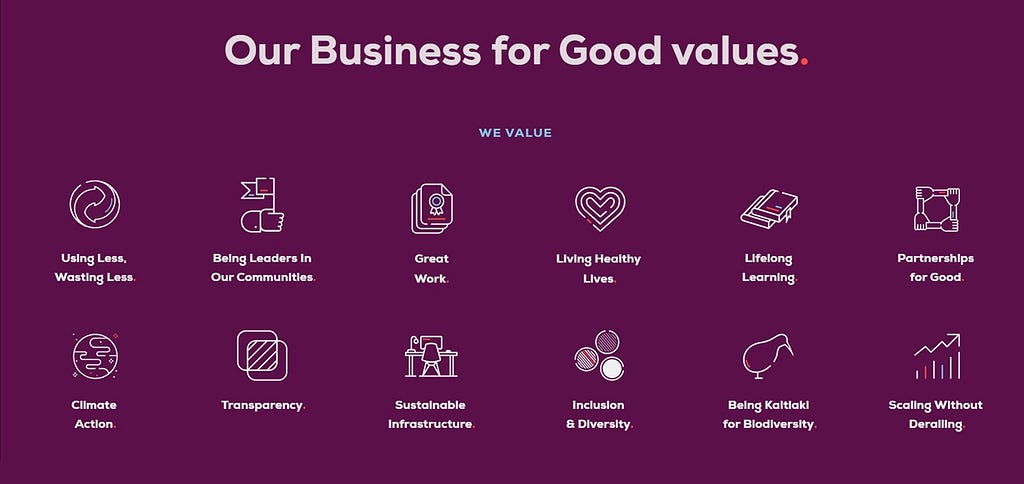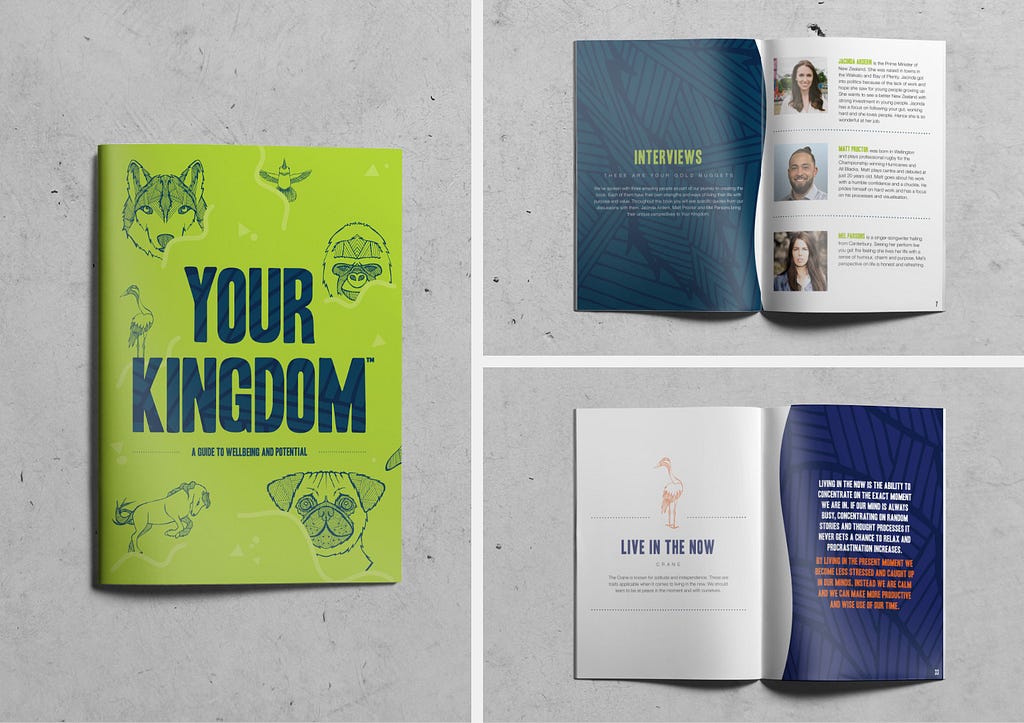3 Lessons to Help Your Company Adopt a Conscious Culture and Build a Better World

The desire at Redvespa to become a Certified B Corporation came from a philosophy that has been part of the company since its founding in 2003. Informal and identified as simply being “part of us,” that philosophy defines Redvespa as being in Business for Good.
Now, through the process of gaining B Corp certification in July 2018, Business for Good is more than just a philosophy. It is an integral part of Redvespa’s way of working and a key driver in our strategy. The most visible shift in Redvespa’s approach came as we launched our inaugural Business for Good Annual Report this month.
Redvespa is part of the community of businesses that have used a third-party verification of their impact. Use the free B Impact Assessment to evaluate your company’s impact on all stakeholders, including the environment, your workers, your community and your customers.
The certification process for B Corp is intensive and took Redvespa about nine months. We weren’t under any illusions that it would be easy — with so much at stake, it shouldn’t be. There were many challenging questions asked along the way and, in the end, certification was a relief—although it offered little respite. The nature of the B Impact Assessment process forced us to be reactive. We responded to the questions, challenged our work and processes, and scraped into the B Corp family by 0.10.

While we could sit back and applaud gaining certification, we know it is the start of something bigger. Our initial aspiration was to gain certification. We are now focused on so much more. Yes, we want that score to be better next time — we are competitive — but there is much more to it than that. The B Impact Assessment told us we were good; now we want to be great. To do that, we need to be strategic and proactive.
In the year since certification we have achieved, learned, and grown an immense amount. Our inaugural Business for Good Annual Report is the culmination of that. It celebrates our achievements in the last 12 months, outlines our actions for the year ahead, and provides a broad vision for embedding Business for Good throughout Redvespa. That vision is entrenched in B Corp and our desire to be more transparent and more connected to our people and communities.
It is also a vision based on a year of intense learning. Here’s a look at the main lessons from that year moving Redvespa toward a more conscious culture.
We Learned When to Be Proactive
The B Impact Assessment used in the B Corp certification process includes questions that touch on all areas of business. When Redvespa went through this process, we knew there would be areas where we had achieved a lot and the answers would be readily available. We also knew there would be some low-hanging fruit to give us easy wins. Then there was everything else. In getting certified, everything else was out of reach.
We were reactive in the certification process, but we knew that the ability to be proactive would come. Although it was obvious there was more we could do, we also had to be honest and acknowledge we couldn’t do it all. We put a framework in place to enable us to focus on the areas where we could have the most impact. It started with a Vision for Sustainability—an internal business case that is now being used by The Sustainability Trust as a template for others to follow.
Our Vision for Sustainability addressed a major aspect of B Corp—environmental impact—where we could focus on short-, medium-, and long-term goals. But the range of questions in the B Impact Assessment raised our awareness of the need to explore our potential for impact across a wider range of issues. Only then could we evolve our Business for Good philosophy in to a way of working.
We Learned to Focus
While the B Corp certification process inspired us to look broadly at the potential for positive impact, our experience in business analysis told us that to be effective, we have to focus. Our Vision for Sustainability set the tone for research into other areas where Redvespa could have meaningful involvement. Actions at different levels that are incremental and scalable are important to ensuring we can manageably and meaningfully make change.
Our experience ensures we know the importance of focusing on issues that are relevant and important to Redvespa. Becoming a B Corp taught us that our current approach would be better if we focused on developing strategy and refining process.
All new staff receive a wellness and sustainability induction, combining their personal well-being with environmental well-being. The staff member leading our Business for Good work was recognised as such through a change in job title to Redvespa’s Business for Good Champion. We produced our Business for Good Annual Report.
For that report, we looked to the United Nations Sustainable Development Goals (SDGs) to give our work context in relation to the global community. This allowed us to return to focusing on which of B Corp’s broad criteria were most relevant to Redvespa. While the SDGs were the end goal of our initiatives and actions, we needed a changemaker approach that ensured connection to Redvespa and its values, people, and community. To achieve that, we adapted the SDGs and incorporated them in our own Redvespa Business for Good Values.

These 12 values cover all areas of our business, from the health and well-being of our people and communities to the impact we have on the planet as individuals and as a business. They are a refinement of the SDGs that allows us to focus on the areas where we can have, or inspire to have, the biggest impact.
We Learned that Challenge is Good
We are a service organisation, which means that taking “good” options isn’t always obvious and definitely isn’t easy. Unlike a manufacturer with products and a supply chain that offer a wealth of opportunities to be “good,” Redvespa has to think laterally to ensure positive impact. Thankfully, we love a challenge and thrive on coming up with creative solutions.
While our approach to social purpose, where we are active and supportive, created some additional challenges in the certification process, the format of B Corp has enabled us to more effectively identify the areas where we can have impact. This has sharpened our focus and illustrated how tough the process can be.
For us, things weren’t hard because of the work required but because of the challenges to our assumptions and our ways of working.
Lots of businesses resist change because their way of working is ingrained—it is “the way we’ve always done it.” That’s not a reason to keep doing it and, in a business where we work collaboratively with other companies to make change and realise potential, it’s not Redvespa’s way of doing things. We already had the right mindset, but the B Impact Assessment process included questions outside our area of expertise and required immediate action.
The positive impact of addressing the challenges of B Corp certification, where we responded quickly and dealt with our assumptions effectively, is that we’re in an even better position to do the same in all areas of our business. We learned that challenge is good.
Business for Good Extends Beyond Redvespa
One of the sparks behind our B Corp certification was a book written by Redvespa’s then-head of social purpose, Jamie Gibson. Your Kingdom: A Guide to Wellness and Potential is a personal book that came out of Gibson’s experiences as a teenager with anxiety. His vision was to create a tool that would help the next generation be better equipped to deal with mental health challenges.

Ensuring that Your Kingdom was accessible to as many people as possible was a key part of its publication. Working with Zeno Project, the social enterprise that Gibson founded, Redvespa sells Your Kingdom under a buy-one, gift-two model so charities and organisations that work directly with youth receive copies. We also gift a copy to all our staff when they start at Redvespa. We have had some incredible responses to Your Kingdom, with one youth worker sharing the emotional story of how it helped save the life of a vulnerable young woman.
Stories like this highlight the value of this book and our work around it. We saw firsthand how we could target an issue like New Zealand’s high youth suicide rate and make an impact. It inspired us to look to B Corp certification. If we could join a global community of changemakers driven to have a positive impact in broad environmental and societal areas, imagine the impact we could have.
We focus a lot on our people, improving their lives, and how we can bring them along on Redvespa’s Business for Good journey. They are our whānau (a Māori word translated as family), and we embrace the role they play in their own whānau and community. Empowering employees to be changemakers and to engage in our initiatives, many of which are driven by them, immediately increases our reach.
We invest in Business for Good because we want our business to be good. But we also do it because we want our community to be great.
B the Change gathers and shares the voices from within the movement of people using business as a force for good and the community of Certified B Corporations. The opinions expressed do not necessarily reflect those of the nonprofit B Lab.

How Being in Business for Good Transformed Our Business—for Good was originally published in B the Change on Medium, where people are continuing the conversation by highlighting and responding to this story.
Source: B the Change
